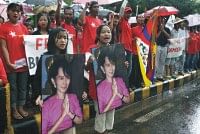Suu Kyi's party hails 1988 uprising as 'turning point'

Myanmar protesters shout anti-military slogans as they display portraits of Myanmar's opposition leader Aung San Suu Kyi during a demonstration to mark the 20th anniversary of the 1988 pro-democracy revolution, in New Delhi yesterday. Photo: AFP
Aung San Suu Kyi's party yesterday hailed a 1988 pro-democracy uprising as a "turning point" in Myanmar's history, as activists silently mourned the movement that was violently crushed by the military.
"This anniversary marks an important historical turning point in Myanmar's politics. People will never forget it," Nyan Win, spokesman for her National League for Democracy (NLD), told AFP.
August 8, 1988 -- a numerologically important date known as 8.8.88 -- marked the beginning of a student-led uprising that drew hundreds of thousands of people into the streets of cities and villages across the country.
The movement capped a year of student protests that resulted in the former dictator Ne Win stepping down in July 1988. With the government in turmoil, the August 8 uprising quickly spread around the country.
Soldiers opened fire to break up the crowds, but the unrest rumbled on for six weeks, until a group of generals staged a coup and reasserted total military control. An estimated 3,000 people were killed in the uprising.
Until then, Aung San Suu Kyi had been the little known daughter of slain liberation hero General Aung San. She had spent most of her life as an expatriate, settling into a comfortable life in British academia.
She happened to be in Myanmar -- then known as Burma -- to care for her ailing mother when the uprising erupted.
On August 26, 1988, she spoke to the crowds outside Myanmar's holiest shrine, the golden Shwedagon Pagoda, and instantly became the public face of the movement.
After the coup she helped form the NLD, but was thrown under house arrest in 1989. Despite her detention, the party won 1990 elections in a landslide, but was never allowed to govern. Since her initial arrest, she has been allowed only a few brief years of freedom.
No remembrances were planned to mark the anniversary in Myanmar, and heavy police security was seen around Yangon -- especially around Shwedagon Pagoda -- to ward off any protests.

 For all latest news, follow The Daily Star's Google News channel.
For all latest news, follow The Daily Star's Google News channel. 



Comments